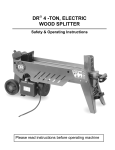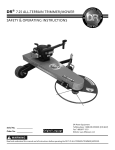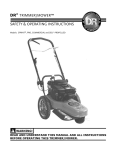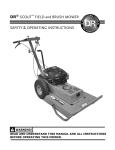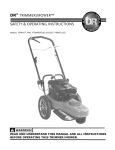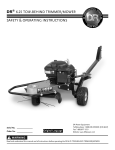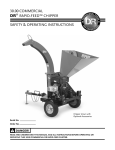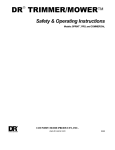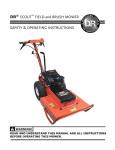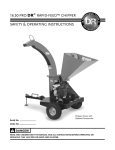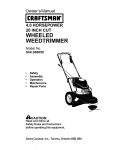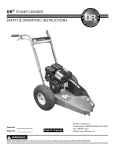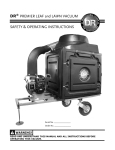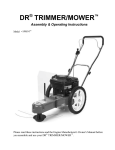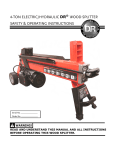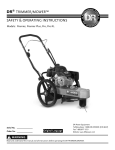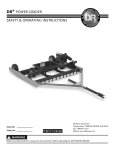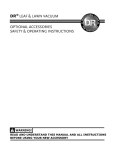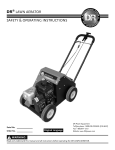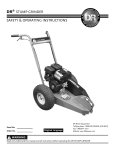Download DR SPRINT PRO-XL SELF-PROPELLED Operating instructions
Transcript
DR® TRIMMER/MOWER™ SAFETY & OPERATING INSTRUCTIONS Models: SPRINT®, PRO, and PRO-XL SELF-PROPELLED Serial No. Order No. Original Language DR Power Equipment Toll-free phone: 1-800-DR-OWNER (376-9637) Fax: 1-802-877-1213 Website: www.DRpower.com Read and understand this manual and all instructions before operating the DR TRIMMER/MOWER. Table of Contents Chapter 1: General Safety Rules............................................................................................................................................................ 3 Chapter 2: Setting Up The DR TRIMMER/MOWER ............................................................................................................................ 6 Chapter 3: Operating The DR TRIMMER/MOWER ............................................................................................................................. 12 Chapter 4: Maintaining The DR TRIMMER/MOWER .......................................................................................................................... 19 Chapter 5: Troubleshooting .................................................................................................................................................................. 31 Chapter 6: Parts Lists, Schematic Diagrams And Warranty ................................................................................................................ 35 Conventions used in this manual This indicates a hazardous situation, which, if not avoided, could result in death or serious injury. This indicates a hazardous situation, which, if not avoided, could result in minor or moderate injury. This information is important in the proper use of your machine. Failure to follow this instruction could result in damage to your machine or property. Serial Number and Order Number A Serial Number is used to identify your machine and is located on the Serial Number Label on your machine. An Order Number is used to check and maintain your order history and is located on the upper left portion of your packing slip. For your convenience and ready reference, enter the Serial Number and Order Number in the space provided on the front cover of this manual. Additional Information and Potential Changes DR Power Equipment reserves the right to discontinue, change, and improve its products at any time without notice or obligation to the purchaser. The descriptions and specifications contained in this manual were in effect at printing. Equipment described within this manual may be optional. Some illustrations may not be applicable to your machine. 2 DR® TRIMMER/MOWER Chapter 1: General Safety Rules Read this safety & operating Instructions manual before you use the DR TRIMMER/MOWER. Become familiar with the operation and service recommendations to ensure the best performance from your machine. If you have any questions or need assistance, please contact us at www.DRpower.com or call toll-free 1-800-DR-OWNER (376-9637) and one of our Technical Support Representatives will be happy to help you. Labels Your DR TRIMMER/MOWER carries prominent labels as reminders for its proper and safe use. Shown below are copies of all the Safety and Information labels that appear on the equipment. Take a moment to study them and make a note of their location on your DR TRIMMER/MOWER as you set up and before you operate the unit. Replace damaged or missing safety and information labels immediately. #127811 #215001 #148221 #240641A #153081 #136491 Protecting Yourself and Those Around You This is a high-powered machine, with moving parts operating with high energy at high speeds. You must operate the machine safely. Unsafe operation can create a number of hazards for you, as well as anyone else in the nearby area. Always take the following precautions when using this machine: keep in mind that the operator or user is responsible for accidents or hazards occurring to other people, their property, and themselves. Always wear protective goggles or safety glasses with side shields while mowing to protect your eyes from possible thrown debris. Avoid wearing loose clothing or jewelry, which can catch on the mower’s moving parts. We recommend wearing gloves while mowing. Be sure your gloves fit properly and do not have loose cuffs or drawstrings. Wear shoes with non-slip treads when using your DR TRIMMER/MOWER. If you have safety shoes, we recommend wearing them. Do not use the machine while barefoot or wearing sandals with exposed toes or heels. Wear long pants while operating the DR TRIMMER/MOWER. Use ear protectors or ear plugs rated for at least 20 dba to protect your hearing. Keep bystanders at least 50 feet away from your work area at all times. The tips of the cutting cords on the DR TRIMMER/MOWER can throw sticks, small stones, gravel, and bits of debris over long distances at great velocity. Do not travel over loose materials such as gravel or mulch with the trimmer head spinning. Doing so could cause personal injury or property damage from thrown objects. Release the bail bar to stop the spinning cords and shut off the engine when another person or pet approaches. Never tamper with safety devices. Check their proper operation regularly. Never operate the machine when under the influence of alcohol, drugs, or medication. In an emergency, to quickly stop the cutting cords, remove your hand from the bail bar. CONTACT US AT www.DRpower.com 3 Operating the Mower Safely This is a high-powered machine, with moving parts operating with high energy at high speeds. You must operate the machine safely. Unsafe operation can create a number of hazards for you, as well as anyone else in the nearby area. Always take the following precautions when using this machine: Never allow people who are unfamiliar with these instructions to use the DR TRIMMER/MOWER. Allow only responsible individuals who are familiar with these rules of safe operation to use your machine. Never place your hands, feet, or any part of your body on or under the mower deck in the path of the spinning cords, belt, pulleys, or near the discharge opening while the engine is running. Keep area of discharge clear of people, animals, buildings, glass, or anything else that will obstruct clear discharge, cause injury, or damage. Your DR Trimmer/Mower is a powerful tool, not a plaything. Exercise extreme caution at all times. The design of your machine is for trimming and mowing grass, weeds, and other growth as specified in this manual. Do not use it for any other purpose. Whenever you leave the operating position to make adjustments, change cords or if you have to remove grass or debris from the underside of the deck, always shut off the engine and wait five (5) minutes to allow parts to cool. Remove the key, if so equipped, and disconnect the spark plug wire and keep the wire away from the spark plug to prevent accidental starting. When operating over uneven terrain and slopes, use extreme caution to ensure solid and firm footing. Keep a firm hold on the handlebar and walk, never run. Stop the cutting cords when crossing gravel drives, walks, or roads. Never operate your unit on a slippery, wet, or muddy surface. Exercise caution to avoid slipping or falling. Always operate the mower from behind the handlebar. Never pass or stand on the discharge side of the machine when the engine is running or cutting cords are spinning. Never, under any conditions, remove, bend, cut, fit, weld, or otherwise alter standard parts on the DR TRIMMER/MOWER. This includes all shields and guards. Modifications to your machine could cause personal injuries and property damage and will void your warranty. If the cutting cords strike a foreign object or if your machine should start making an unusual noise or vibration, stop the engine and wait five (5) minutes for all moving parts to come to a complete stop and cool. Vibration is generally a warning of trouble. Disconnect the spark plug wire and inspect for damage. Clean and repair and/or replace damaged parts. While using the DR TRIMMER/MOWER, do not hurry or take things for granted. When in doubt about the equipment or your surroundings, stop the machine and take the time to look things over. Make sure that you have 100% control of the mower at all times. Watch for traffic when mowing near roadways. Use the machine only in daylight. Be cautious when using your DR TRIMMER/MOWER around fencing, wires, ropes, and hoses. It is possible that these and other debris can become wound around the line plates of the machine, potentially damaging the bearings or injuring you. Do not operate the DR TRIMMER/MOWER on slopes greater than 20 degrees. Keep all nuts and bolts tight and keep the equipment in good operating condition. Safety for Children and Pets Tragic accidents can occur if the operator is not alert to the presence of children and pets. Children are often attracted to the machine and the mowing activity. Never assume that children will remain where you last saw them. Always follow these precautions: Keep children and pets out of the working area and under the watchful care of a responsible adult. Be alert and turn the machine off if children or pets enter the work area. Never allow children to operate the DR TRIMMER/MOWER. Use extra care when approaching blind corners, shrubs, trees, or other objects that may obscure your vision. 4 DR® TRIMMER/MOWER Safety with Gasoline - Powered Machines Gasoline is a highly flammable liquid. Gasoline also gives off flammable vapor that can be easily ignited and cause a fire or explosion. Never overlook the hazards of gasoline. Always follow these precautions: Never run the engine in an enclosed area or without proper ventilation as the exhaust from the engine contains carbon monoxide, which is an odorless, tasteless, and deadly poisonous gas. Store all fuel and oil in containers specifically designed and approved for this purpose and keep away from heat and open flame, and out of the reach of children. Replace rubber fuel lines and grommets when worn or damaged and after 5 years of use. Fill the gasoline tank outdoors with the engine off and allow the engine to cool completely. Don't handle gasoline if you or anyone nearby is smoking, or if you're near anything that could cause it to ignite or explode. Reinstall the fuel tank Cap and fuel container cap securely. If you spill gasoline, do not attempt to start the engine. Move the machine away from the area of the spill and avoid creating any source of ignition until the gas vapors have dissipated. Wipe up any spilled fuel to prevent a fire hazard and properly dispose of the waste. Allow the engine to cool completely before storing in any enclosure. Never store a machine that has gas in the tank, or a fuel container, near an open flame or spark such as a water heater, space heater, clothes dryer or furnace. Never make adjustments or repairs with the engine running. Shut down the engine, wait 5 minutes, disconnect the spark plug wire, keeping it away from the spark plug to prevent accidental starting before making adjustments or repairs. Never tamper with the engine’s governor setting. The governor controls the maximum safe operation speed and protects the engine. Over-speeding the engine is dangerous and will cause damage to the engine and to the other moving parts of the machine. If required, see your authorized dealer for engine governor adjustments. Keep combustible substances away from the engine when it is hot. Never cover the machine while the muffler is still hot. Do not operate the engine with the air cleaner or cover over the carburetor air-intake removed, except for adjustment. Removal of such parts could create a fire hazard. Do not use flammable solutions to clean air filter. The muffler and engine become very hot with use and can cause a severe burn; do not touch. Allow the engine to cool before refueling, doing maintenance, or making adjustments. Do not mow in the rain. Water on the spark plug may cause the engine to stall. Keep combustible substances away from the engine when it is hot. Never cover the machine while the muffler is still hot. A Note to All Users Under California law, and the laws of some other states, you are not permitted to operate an internal combustion engine using hydrocarbon fuels without an engine spark arrester. This also applies to operation on US Forest Lands. All DR® TRIMMER/MOWERS shipped to California, New Mexico and Washington State are provided with spark arresters. Failure of the owner or operator to maintain this equipment in compliance with state regulations is a misdemeanor under California law and may be in violation of other state and/or federal regulations. Contact your State Park Association or the appropriate state organization for specific information in your area. No list of warnings and cautions can be all-inclusive. If situations occur that are not covered by this manual, the operator must apply common sense and operate this DR TRIMMER/MOWER in a safe manner. Contact us at www.DRpower.com or call 1-800DR-OWNER (376-9637) for assistance. CONTACT US AT www.DRpower.com 5 Chapter 2: Setting Up The DR TRIMMER/MOWER It may be helpful to familiarize yourself with the controls and features of your DR TRIMMER/MOWER as shown in Figure 1 before beginning these procedures. If you have any questions at all, please feel free to contact us at www.DRpower.com. DR TRIMMER/MOWER Controls and Features Bail Bar Throttle PTA Lever Bail Bar Spring (Key shipped here) Recoil Starter Key Switch Oil Fill Fuel Fill Handlebar Adjuster Primer Bulb Oil Filter Mow-Ball Support Cutting Cord Side Shield SPRINT and PRO Models Wheel Clutch Lever Bail Bar Throttle Bail Bar Spring (Key shipped here) Key Switch Recoil Starter Oil Fill Handlebar Adjuster Fuel Fill Primer Bulb Oil Filter Side Shield Mow-Ball Support 6 DR® TRIMMER/MOWER Cutting Cord PRO-XL SELF-PROPELLED Model Figure 1 Specifications MECHANICAL SPECIFICATIONS Engine Series Torque Fuel Capacity Oil Capacity Air Filter Oil Filter Wheels Frame Cutting Width Cutting Height Machine Width Machine Weight 6.25 Sprint Briggs & Stratton Quantum 6.25 ft. lbs.(8.5 Nm) 1.5 Quarts (1.4 Liters) 1.25 pints (0.59 Liter) Pleated Paper NA 14" Resin 14-Gauge Steel 20" 1-1/2" to 4" 23" 68 lbs. Manual Start, 75 lbs. Electric Start 6.75 PRO Briggs & Stratton Quantum 6.75 ft. lbs.(9.1 Nm) 1.5 Quarts (1.4 Liters) 1.25 pints (0.59 Liter) Pleated Paper NA 16" Resin 14-Guage Steel 20" 1-1/2" to 4" 23" 70 lbs. Manual Start, 77 lbs. Electric Start 6.75 PRO-XL Self Propelled Briggs & Stratton Quantum 6.75 ft. lbs.(9.1 Nm) 1.5 Quarts (1.5 Liters) 1.25 pints (0.59 Liter) Pleated Paper NA 12" Steel Spokes Cast Aluminum 20" 1-1/2" to 4" 20 1/2" 88 lbs. Electric Start Unpacking the DR TRIMMER/MOWER Stabilize the shipping box at floor level in a clean flat area before attempting to unpack the Trimmer/Mower. For your safety we recommend you have two people for the following procedures. Tools Needed: Utility Knife 5/8" Wrench Wire Cutters 1. Position the Shipping Box at floor level in a clean flat area with the text on the side of the Box right side up (Figure 2). 2. With a Utility Knife, cut the Tape that secures the Box Flaps at both ends and along the center. Tape Figure 2 Wheels Parts Supplied in Box (Figure 3): DR TRIMMER/MOWER Trimmer Wheels Product Package Trimmer Cord Pack Mow-Ball™ Two Keys, for electric-starting models (located just below the Bail Bar Spring of the Trimmer) Compare the contents of the Shipping Box with the “Parts Supplied” list above. If you have any questions please contact us at www.DRpower.com or call 1-800DR-OWNER (376-9637) for assistance. DR Trimmer/ Mower Keys Bail Bar Spring MowBall™ Trimmer Cord Pack Product Package Figure 3 CONTACT US AT www.DRpower.com 7 Top Rear Insert Handlebar Hand Knobs Wheel Cable Ties Handlebar MowBall™ Package Frame Nose Insert Product Package Figure 4 3. Use Wire Cutters to cut the Cable Ties that attach the Wheels to the Handlebar and the Cable Tie that secures the Handlebar to the Box (Figure 4). 4. Remove the Wheels, Product Package and Top Rear Insert from the Shipping Box. 5. Loosen the Handlebar Adjusting Knobs and rotate the Handlebar up enough to remove the Frame Nose Insert and Mow-Ball™ Package. 6. Lower the Handlebar back down. NOTE: Do not lift on the Upper Handlebar. Lift from the Lower Handlebar and bottom of the machine. 7. With help from another person, lift the Trimmer from the Shipping Box (Figure 5). 8. Position the Trimmer on the end of the Box or have someone position it on the ground so you have access to the ends of the Axle (Figure 6). Lower Handlebar Tip: Do not rotate the Shipping Caps off. Pull them from side to side so the nut stays on the Axle. 9. Remove the Caps and Locknuts from both ends of the Axle. NOTE: The right and left side of the machine is referenced from the Operating position. 10. For the non self-propelled Trimmer, slide the Wheels onto the Axle and go to step 13. Do Not Lift on Upper Handlebar Figure 5 NOTE: On the self-propelled Trimmer the right side wheel has a red mark and will face in toward the Trimmer Body. The left side wheel has a Black mark and will face in toward the Trimmer Body. 11. For the self-propelled Trimmer, install the left side wheel onto the Axle by rotating it counter-clockwise as you slide it onto the Axle (Figure 7). Axle Shipping Cap Locknut (under cap) NOTE: A plastic plug will come out of the Wheels as you slide them on. Save this plug to insert back into the Wheels if they need to be removed in the future. 12. Install the right side wheel onto the Axle by rotating it clockwise as you slide it onto the Axle. 13. Secure the Wheels with the two Locknuts using a 5/8" Wrench. Figure 6 14. If it’s not already there, place the Trimmer onto the ground. Wheel (left side shown) Axle Locknut Figure 7 8 DR® TRIMMER/MOWER Black mark on Inside of Hub (Red mark on Right side wheel) 15. Lift the Upper Handlebar until it is near the operator position and tighten the Handlebar Adjuster Knobs (Figure 8) (see the Safety & Operating Instructions manual for more handlebar adjustment details). NOTE: Ensure that the teeth of the Handlebar Adjuster mesh correctly as you tighten the Knobs. Meshing Teeth 16. Open the Product Package and remove the Trimmer Head Locking Tool and literature (Figure 9). 17. Remove the Mow-Ball Assembly from it’s packaging and make sure the parts are assembled in the correct order and orientation (Figure 10). 18. Insert the Head Locking Tool that came in the Product Pack into the hole in the nose of the Frame (Figure 11). Handlebar Adjusting Knob Figure 8 19. Looking down at the top of the Frame, thread the Mow-Ball™ Assembly counterclockwise until the tool slides into a second hole in the shaft, locking the Shaft so you can continue to screw on the Mow-Ball™ Assembly until hand tight. NOTE: If the Mow-Ball™ Assembly continues to turn, but does not tighten, check to be sure that you locked the Head Locking Tool into the shaft. 20. Remove the Head Locking Tool after you have tightened the Mow-Ball™ Support Assembly. Do not throw away your Trimmer packaging materials. Store the shipping box and all inserts in a dry, safe area for future use. If there are any questions contact us at www.DRpower.com or call 1-800-DR-OWNER (376-9637). Trimmer Head Locking Tool Figure 9 Outer Lip Facing Up Be sure to fill the engine with oil and gas before use. If you start the engine without oil in the crankcase, you will damage the engine beyond repair and the warranty will not cover this damage. See the next section for adding oil and gas. Product Literature (owners manual, engine manual, etc.) Back-up Plate Spacer Six Line Plates Bolt Mow-Ball™ Figure 10 Hole in Frame Nose Head Locking Tool Tighten Mow-Ball™ Assembly Figure 11 CONTACT US AT www.DRpower.com 9 Adding Oil and Gasoline You must add oil before starting the engine. This machine is shipped without oil. Traces of oil may be in the reservoir from factory testing, but you must add oil before starting the engine. Fill the reservoir slowly, checking the level frequently to avoid overfilling. To get an accurate reading when checking the oil level: - the machine should be on a level surface. - the dipstick should be screwed down to ensure an accurate oil level reading. Tip: To avoid confusion, we recommend leaving the caps ON the Fuel and Oil Fills until you are ready to pour either gasoline or oil into the correct Fill. NOTE: You will need approximately 15 to 22 ounces of SAE 30 high detergent oil depending on Engine type. Use only SAE 30 high detergent oil classified “For Service SF, SG, SH, SJ” or higher. Do not use special additives. Other types of oil could cause problems with the operation of your machine. Please refer to your Engine Owner’s Manual for detailed information on oil quantity, and cold temperature oil specifications. 1. Place the machine on a level surface and initially add 1/2 of the SAE 30 High Detergent oil (recommended by the Engine Manufacturer) into the Oil Fill (Figure 12) and wait one (1) minute for the oil to settle Oil Fill 2. Check the Dipstick and continue adding a few ounces of oil at a time, rechecking the Dipstick until the oil reaches the fill mark. Be careful not to overfill. Gas Fill Fill the fuel tank outdoors or in a well-ventilated area, away from sparks, open flames, pilot lights, heat, and other ignition sources. NOTE: Discard the blue Protective-Shipping Cap provided by some Engine Manufacturers. You will find this Protective-Shipping Cap under the Fuel Fill Screw Cap or in the tank Filler Tube. See your Engine Owner’s Manual for more fuel information. Figure 12 3. Fill the Fuel Tank with fresh, unleaded gas (with a minimum of 85 Octane), to not more than a 1/4" from the bottom of the Fill Neck to allow for Fuel expansion. Be careful not to overfill and reinstall the Cap before starting the Engine. See your Engine Owner’s Manual for more information. Negative (-) Battery Terminal Connect Black Battery Wire NOTE: To refill the Fuel Tank, turn the Engine OFF, and let the Engine cool at least two (2) minutes before removing the Fuel Fill Cap. Connecting the Battery Wire (Electric-Starting Models Only) We ship all Electric-Starting Trimmers with the negative Battery wire disconnected. This prevents the Battery from discharging during shipment. Before using your Trimmer, you must connect the Battery wire. 1. Connect the black wire by pushing the plastic connector onto the negative (– ) Battery terminal (Figure 13). NOTE: The red wire should already be attached to the positive terminal. Figure 13 10 DR® TRIMMER/MOWER Adjusting the Handlebar It is important to find a Handlebar height that allows the Mow-Ball Support to glide along the ground and remain balanced so you do not have to push down or pull up on the Handlebar. Upper Handlebar Lower Handlebar Bolt At the proper height, your hands should rest at a comfortable level and the front end of the Trimmer should glide easily on the Mow-Ball Support as shown in Figure 25 on page 16. You may find you like different Handlebar heights for different mowing conditions. There are two ways to adjust the height of the Handlebar outlined in the following steps: 1. Loosen both the Adjustment Knobs and move the Handlebar up or down until the adjustment is the same on both sides. Use the Notches on the Adjusters (Figure 14 “A”) to measure how many Teeth you have moved away from the center. When you have found a comfortable height, tighten the Adjustment Knobs securely. 2. For additional height adjustment options, there are two holes in the Upper and Lower Handlebars where the Adjustment Knobs are located (Figure 14 “B”). Most people start with the Handlebars set in the Lower holes of both the Upper and Lower Handlebar. You can adjust the height up or down by removing the Adjustment Knob Assembly and repositioning the Handlebars to a higher or lower hole. Be sure the Notches in the two Adjusters line up when you reassemble them (Figure 14 “A”). You may need to adjust the PTA Lever as well. See the next section. Adjustment Knob Inside Adjuster Outside Notches Adjuster Lined Up “A” Upper Handlebar Lower Handlebar Height Adjustment Holes Adjusting the PTA (Parallel Trimming Action) Lever – SPRINT and PRO Models “B” Before performing any adjustment, maintenance procedure or inspection, stop the engine, wait five (5) minutes to allow parts to cool and disconnect the spark plug wire, keeping it away from the spark plug. Figure 14 NOTE: This adjustment is not applicable to the SELF-PROPELLED model. It is easy to adjust the PTA feature. If you have moved the Handlebar up or down, the PTA (Parallel Trimming Action) Lever may need adjustment. When the PTA feature is properly engaged, there should be just a little slack in the cable. For more information on PTA, please read the section called Using PTA (Parallel Trimming Action) on page 13. Loosen Knob 1. Loosen the Knob on the PTA Control by turning it counterclockwise (Figure 15). 2. Move the Assembly up the Handlebar to tighten the cable or down the Handlebar to loosen it. 3. Retighten the Knob. Figure 15 Slide Up or Down to adjust l k CONTACT US AT www.DRpower.com 11 Chapter 3: Operating The DR TRIMMER/MOWER You may find it helpful to review the DR TRIMMER/MOWER Controls and Features (Figure 1 on page 6) before reading this chapter. The design of your machine is for trimming and mowing grass, weeds, and other growth as specified in this manual. Do not use it for any other purpose as it could cause serious injury. Contact with internal rotating parts will cause serious personal injury. Never put hands, face, feet, or clothing under the mower deck or discharge opening at any time. Before performing any adjustment, maintenance procedure or inspection, stop the engine, wait five (5) minutes to allow parts to cool. Disconnect the spark plug wire, keeping it away from the spark plug. Before Starting the Engine 1. Check the oil level every time you use the DR TRIMMER/MOWER (Figure 12 on page 10). 2. Check the gas level (Figure 12 on page 10). 3. Remove any debris buildup from the underside of the machine. Electric-Starting NOTE: Use the following steps with Electric-Starting models only. 1. Push the Throttle Control Lever on the right side of the Handlebar (Figure 1 on page 6) all the way forward to the RABBIT (Fast) position. 2. If your model has an Engine Primer, push the Primer Bulb IN (Figure 1 on page 6) and completely release it, lifting your finger and letting it pop back to its original position. Repeat three to four times. NOTE: Priming is usually not necessary when restarting a warm Engine. In cool weather, you may need to repeat the priming operation. 3. Turn the Key (Figure 1 on page 6) to the START position until the Engine starts, then release. The Key will snap back to the RUN position and the Engine will continue to run. NOTE: Do not engage the Bail Bar (Trimmer Head Control) until after the Engine has started. If the engine fails to start after TEN (10) seconds of continuous cranking, turn the key to the off position and allow the starter motor to cool. Check the cause of hard starting; See Chapter 5 - Troubleshooting. Manual-Starting NOTE: You may use this starting method with both Manual and Electric-Starting models. 1. Push the Throttle Control Lever on the right side of the Handlebar (Figure 1 on page 6) all the way forward to the RABBIT (Fast) position. 2. If your model has an Engine Primer, push the Primer Bulb IN (Figure 1 on page 6) and completely release it, lifting your finger and letting it pop back to its original position. Repeat three to four times. NOTE: Priming is usually not necessary when restarting a warm engine. In cool weather, you may need to repeat the priming procedure. 3. Grasp the Recoil Starter Handle (Figure 1 on page 6) and slowly pull until you feel resistance. Let the cord retract a little bit, then pull the cord rapidly to start the Engine. One or two pulls usually starts the DR TRIMMER/MOWER. It may be necessary to repeat the priming operation if the machine does not start within two pulls. 12 DR® TRIMMER/MOWER NOTE: Do not engage the Bail Bar (Trimmer Head Control) until after the Engine has started. Stopping the Engine 1. Move the Throttle Control Lever (Figure 1 on page 6) all the way back past the TURTLE (Slow) position to the STOP position. NOTE: If you have an Electric-Starting model, please note that the Key does not stop the Engine. You must follow these instructions to stop the Engine for both Electric and Manual-Starting models. 2. Remove the Key for safety. The Key has a pressure lock that prevents it from vibrating loose during operation. To remove the Key, push it in and then quickly and firmly pull it out. If the Key becomes difficult to remove, apply SAE 30 Oil into the Keyhole. Engaging the Trimmer Head 1. Bring the Bail Bar toward you and grip it together with the Handlebar (Figure 1 on page 6). Keep holding the Bail Bar to the Handlebar. The Cutting Cords will rotate and will continue to rotate until you release the Bail Bar. Stopping the Cords from Spinning 1. Release the Bail Bar from the Handlebar. The Trimmer Head will stop spinning while the Engine continues to run. Engaging the Wheel Drive – PRO-XL SELF-PROPELLED model NOTE: The SELF-PROPELLED DR TRIMMER/MOWER has a single speed forward Transmission. 1. Gently squeeze the Clutch Lever (Figure 1 on page 6) to engage the Wheel Drive. 2. Release the Clutch Lever to stop the Wheel Drive. Using the PTA™ (Parallel Trimming Action) - SPRINT and PRO models only Your DR TRIMMER/MOWER’S PTA feature allows you to move the machine in a straight line while the Trimmer Head is both pivoted and tilted to the left for better access to fence lines and other obstacles. PTA allows you to trim in difficult areas without having to pull the machine back and forth. The following two sections explain how to use the PTA and how to return your Trimmer to Normal operation after using PTA. Use caution when edging along gravel paths and driveways. Flying debris can cause serious damage and injury. When using PTA, you should install the cutting cords in one of the bottom four line plates only. Using the upper line plates may cause the cords to hit the wheel. For more information, see the DR Trimmer/Mower Cutting Cords on page 15. CONTACT US AT www.DRpower.com 13 NOTE: In PTA mode, the Trimmer’s Wheels stay straight while the Trimmer Head tilts (Figure 16). The Cutting Cords extend beyond the wheelbase in the PTA mode (Figure 16), allowing you to easily cut under obstacles. The Trimmer Head and the Cutting Cords also tilt slightly in PTA mode so you can edge and trim along gardens, paths, and driveways (Figure 16). When using PTA along garden edges, fences, and buildings, we recommend making your first pass with the DR TRIMMER/MOWER in the Normal mowing position, staying 4 to 8 inches from the obstacle; and then return for another pass with the machine in PTA mode. Engaging the PTA™ Normal Mode 3. Stand in the Operator’s position. Cords Extended 4. Pull the PTA Lever (Figure 17) against the Handlebar and hold it there. This unlocks the Axle (Figure 18). NOTE: Figure 18 shows the Axle with the Wheel removed for clarity. 5. Push down on the Handlebar to tip the nose of the machine a few inches off the ground. Balancing the weight of the machine on the Wheels makes it easier to pivot the front of the Trimmer to the left. 6. While continuing to hold the PTA Lever down, grip the sides of the Handlebar while pulling up with the right hand and pushing down with the left, swinging the front of the Trimmer to the left. 7. Release the PTA Lever. This will lock the Axle in PTA mode (Figure 18). PTA Mode Figure 16 Returning to Normal Mode 1. Pull the PTA Lever (Figure 17) against the Handlebar and hold it there. 2. Push down on the Handlebar to tip the nose of the machine up a few inches off the ground. 3. While continuing to hold the PTA Lever down, grip the sides of the Handlebar while pulling up with the left hand and pushing down with the right, swinging the front of the Trimmer to the right, and stopping at center. 4. Release the PTA Lever. This locks the Axle in the Normal operation mode (Figure 18). Figure 17 PTA Lever Unlocked 14 DR® TRIMMER/MOWER PTA Lever locked in PTA Figure 18 PTA Lever locked in Normal Mode The DR TRIMMER/MOWER Cutting Cords Same on This Side Before performing any adjustment, maintenance procedure or inspection, stop the engine, wait five (5) minutes to allow parts to cool and disconnect the spark plug wire, keeping it away from the spark plug. Running the trimmer with only one cord installed, or cords installed at other than 180 degrees apart can cause excessive vibration and may damage the machine. The following figures (Figures 19 and 20) illustrate the Cords installation on the Line Plates. These figures show the Line Plates from a cross section point of view. It may look complicated, but once you have done it a couple of times, it’s easy. There are two (2) installation points on each Line Plate. Each point is 180 degrees apart. Always install two (2) Cords, one opposite the other. In Here Figure 19 Out Here Installing Cords Reference Figures 21–23 for Cord installation. Your DR TRIMMER/MOWER shipped from the factory with the Cords installed in this manner. When using PTA™, install the cutting cords in one of the bottom four line plates. Installing the cutting cords on the upper line plates can cause the cord to hit the wheel. For more information on using PTA™, see using PTA™ on page 13. NOTE: After you install the Cords, and before trimming, engage the Cutting Head with the Engine running and spin new Cords for a few seconds so they pull tight and are set. Out Here In Here Out Here In Here In Here Top View In Here In Here 1. Insert the ends of the Cords into the openings in the Line Plate (Figure 21). 2. Push the Cord through until it comes out the center hole in the Line Plate (Figure 22). You may also reference Figures 19 and 20 for installing the Cords. Adjust the Cords so the tips are even. Out Here Out Here Figure 20 3. Pull the Cords through the loop and push the loop up into the Line Plate groove above them (Figure 23) and then pull the Cords tight. Figure 21 Figure 22 Figure 23 CONTACT US AT www.DRpower.com 15 Cord Tips We ship two (2) thicknesses of Cutting Cord with your DR TRIMMER/MOWER. The Cords are Blue (175-mil) and Green (155-mil). Because conditions and vegetation vary so much, you should experiment with Cord weights (diameters) to discover what works best for your particular mowing and trimming situations. Here are a few things to keep in mind: If you buy Cutting Cord in rolls, cut it in 23" lengths. Cord life depends on trimming conditions. Replace Cords when they become broken or frayed. The smallest diameter Cord capable of cutting the material at hand combined with the fastest Engine speed usually provides the best grass trimming performance. When you need more power for thicker growth such as berry canes, brambles, thistles, or ragweed, you may want to use the 175-mil Cord in combination with the highest Engine speed. Ease the ends of the Cord into heavy growth and move slowly through thick growth. If there are woody weeds in the material you are cutting, the cutting Cords may wrap around the stalks they cannot cut, and pull away from the Trimmer Head. Please note that installing more than two (2) Cords at a time does not improve trimming performance, in fact, it can lessen it. Adding additional Cords creates drag on the Trimmer Head, robs the Engine of power, and may cause wrapping. Installing two (2) Cords, 180 degrees apart, is the best method for optimal trimming performance. When replacing Cords, do it one at a time and use the old Cord to mark the position for the new Cord that you are replacing. If the Cord breaks off flush at the Line Plate, use the new Cord to push out the old Cord. Storing the Cord in a plastic bag with a damp sponge or cloth will help keep it pliable. You can also soak your Cutting Cord in a bucket of room temperature water for a few days before use to make it more pliable. Adjusting the Cutting Height When using the PTA™ feature, install the cutting cords in one of the four bottom line plates only. Adjusting the Cutting Height is easy. Cutting heights range in 1/2-inch increments from 1-1/2 inches when using the bottom Line Plate, to approximately 4 inches when using the top Line Plate (Figure 24). Figure 24 Install the Cutting Cords in the Line Plate that gives you the desired cutting height. The Mow-Ball™ Support Allow the front end of the machine to rest lightly on the Mow-Ball Support as you are trimming. The Mow-Ball Support should glide on the ground as you maneuver the machine. To achieve the best and smoothest cut, do not lift up on the Handlebar while operating your DR TRIMMER/MOWER. Lifting the Handlebar will force weight down on the Mow-Ball Support. This uses more energy, slows the cutting, and produces an unsatisfactory cut. Ideally, the MowBall Support should lightly rest on the ground while the Wheels balance most of the weight of the machine (Figure 25). Figure 25 16 DR® TRIMMER/MOWER Obstacle Tips Dealing with obstacles in the terrain is easy with your new DR TRIMMER/MOWER. The following section explains how to approach most common obstacles. The trimmer engine's power can easily throw stones, sticks, and other debris at great velocity, which could cause personal injury or property damage. Do not run the machine over gravel driveways or over loose stones or mulch with the trimmer head spinning. Tip: The DR TRIMMER/MOWER discharges cut material to the right. Always try to cut and trim with the uncut tall grass or weeds on the left. Always check your work area before trimming and remove any debris that might tangle or damage the machine. If you do run into debris and the Trimmer becomes tangled, turn off the Engine and disconnect the Spark Plug wire before attempting to untangle the machine. For the neatest appearance, do your trimming first, discharging clippings away from borders and shrubs, then do your mowing. Many owners like to mow easy, open areas with their regular riding or walkbehind mower and finish trimming all the odd and hard-to-reach spots with the DR TRIMMER/MOWER (Figure 26). Heavy Growth Figure 26 Take your time in heavy growth. Be sure to keep uncut material to your left, maintaining a clear discharge area to your right (Figure 27). If the machine cannot do it all in one pass, overlap half of the cutting swath. If the grass is very thick and heavy, try raising the Trimmer Head off the ground a few inches by pushing down on the Handlebar. Cut the material at this height, and then make a second pass with the Mow-Ball Support close to the ground. Ease the DR TRIMMER/MOWER into denser growth. If the material is too tough or woody to cut, the Cutting Cords will wrap around it, wear down, or even break off. Sometimes the growth is so heavy, you cannot mow it in rows. Use a forward and back “vacuum cleaner” motion in these cases. Tip: Use the “two pass”, one half overlap method, whenever possible. PRO-XL SELF-PROPELLED Model Tips: In heavy growth it is best to make two (2) passes at 1/2 the cutting width. Figure 27 If you must go back and forth in the “vacuum cleaner” motion, be sure to release the Wheel Clutch Lever when pulling the Trimmer back. CONTACT US AT www.DRpower.com 17 Wet Conditions Make sure of your footing when operating in wet conditions. Because there is no housing to restrict the flow of cut material, you can also use your DR TRIMMER/MOWER to mow wet or heavy growth. You can use the DR in damp conditions, after a rain, or in the early morning dew without clogging or stalling. You can also mow wet areas such as ditches and around ponds (Figure 28). NOTE: NEVER mow in the rain. Water on the Spark Plug may cause the Engine to stall. Figure 28 Very Dry Conditions Frequently remove debris from the recoil guard on top of the engine and the cooling fins on the front of the engine to prevent overheating and engine damage. When trimming and mowing in very dry conditions, be extra cautious of cut grass, chaff, weeds, seeds, etc., accumulating on the Engine, especially around the Recoil-Starter Housing and Engine Cooling Fins. Please see the Engine Owner’s Manual for more detailed information on cleaning the Air Intake, Air Filter, and Cooling System on the Engine. Slopes Make sure of your footing when operating on slopes. You can trim and mow on slopes up to 20 degrees. Continuous use on slopes steeper than 20 degrees may deprive the Engine of adequate lubrication, and damage components. Windrows The DR TRIMMER/MOWER Cutting Cords cut even tall grass in just one pass, so you can collect clippings and leaves for mulch without raking. The machine ejects cut material to its right side, so you can use it like a lawn broom to make windrows for easy clean-up. Firebreaks Use your Trimmer as a labor saving tool to cut material when creating firebreaks. Garden Clean-Up The DR TRIMMER/MOWER is perfect for cutting down dead perennials, annuals, and wildflowers, saving you hours of hand pruning and deadheading. You can also re-cut downed material a second time to create mulch for garden beds. 18 DR® TRIMMER/MOWER Chapter 4: Maintaining The DR TRIMMER/MOWER Regular maintenance is the way to ensure the best performance and long life of your machine. Please refer to this manual and the engine manufacturer's owner's manual for maintenance procedures. Service intervals listed in the checklist below supersede those listed in the engine manufacturer's owner's manual. Before performing any maintenance procedure or inspection, stop the engine, wait five (5) minutes to allow all parts to cool. Disconnect the spark plug wire, keeping it away from the spark plug. Regular Maintenance Checklist NOTE: Consider that the service intervals shown are the maximum under normal operating conditions. Increase frequencies under extremely dirty or dusty conditions. PROCEDURE EVERY 25 HOURS BEFORE EACH USE Check Engine Oil Level Check General Equipment Condition, e.g. Nuts, Bolts, Welds, etc. Check and clean out the Mow-Ball™ Support. Replace broken or frayed Cutting Cords. Check the Mow-Ball™ Support Line Plates for wear. Clean Engine Exterior, Cooling Fins and remove collected grass trimmings. Check the Belt for fraying or stretching. Lubricate Throttle Cable, Trimmer Control Cable and Idler Pulley with SAE 30 Oil. Clean Engine Air Foam Filter Change the Engine Oil and the Oil Filter* EVERY 100 HOURS 1st time 5 hours Replace the Engine Paper Air Filter Cartridge Adjust Clutch Cable on the SELF-PROPELLED model. Remove the Bottom Shield and clean out collected debris. Check Battery Voltage (Electric-Start models) Replace the Spark Plug * An Oil Filter is on COMMERCIAL and SELF-PROPELLED models only Removing the Mow-Ball ™ Support Assembly Frame Tools and Supplies Needed: Head Locking Tool (supplied with your DR TRIMMER/MOWER) or a #3 Phillips head Screwdriver with at least a 6" shank Gloves 1. Insert the Head Locking Tool or Screwdriver into the hole in the Frame, then rotate the Mow-Ball™ Support Assembly until the tool fits into a second hole in the shaft, locking it into place (Figure 29). Head Locking Tool inserted here Loosen Figure 29 CONTACT US AT www.DRpower.com 19 2. Looking down at the top of the Frame, turn the Mow-Ball™ Support Assembly clockwise until it unscrews completely from the Bearing Housing (Figure 30). Remove the Tool or Screwdriver after you have removed the Mow-Ball™ Support Assembly. NOTE: If the Mow-Ball™ Support Assembly continues to turn, but does not come off, check to be sure that you locked the Head Locking Tool or Screwdriver into the shaft. 3. To reinstall the Mow-Ball™ Support Assembly, reverse the above instructions. Reassembling the Mow-Ball™ Support Assembly Figure 30 Backup Plate (curve faces up) Line Plate Standoff Before performing any adjustment, maintenance procedure or inspection, stop the engine, wait five (5) minutes to allow parts to cool and disconnect the spark plug wire, keeping it away from the spark plug. Line Plate (6) Improper installation can cause damage to the trimmer bearings. Following these directions carefully will protect your machine from damage. Reassemble the components in the order shown in figure 31. Cutting Cord 1. Position the Backup Plate with the lip of the curve facing up (Figure 31). 2. Stack the Line Plates on top of one another with the bumps on the bottom locking into the grooves on top of each Plate. 3. Insert the Line Plate Standoff onto the center of the stack (Figure 31). Mow-Ball™ Support 4. Place the head of the Mow-Ball™ Support Bolt so it is sitting in the groove at the bottom of the Mow-Ball™ Support. Mow-Ball™ Support Bolt Figure 31 5. Hold the Bolt Head in place with your finger and turn the Mow-Ball™ Support Assembly clockwise until it is finger tight. 6. Insert the Head Locking Tool or Screwdriver as shown in Figure 29 on page 19 and tighten the assembly securely by turning the Mow-Ball™ Support Assembly counterclockwise when looking down on the top of the Frame. NOTE: If there is a space between any of the components of the assembled MowBall™ Support, repeat the stacking procedure. Removing the Stone Guard Flap - SPRINT and PRO Models Before performing any maintenance procedure or inspection, stop the engine, wait five (5) minutes to allow all parts to cool. Disconnect the spark plug wire, keeping it away from the spark plug. NOTE: We turned the Trimmer on its side to take the photos in this section. To do so, we removed gas and oil from the machine. You can access the underside of the Trimmer without having to drain the oil by tilting back on its handlebar. Tilting back with a full Tank will probably cause the gas to leak and so draining the gas is still a good idea. 20 DR® TRIMMER/MOWER Remove Screws Tool needed: 3/8" Wrench 1. Remove the screws on either side of the Stone Guard and drop it from the Frame (Figure 32). Tip: Keep the screws together with the Stone Guard. Removing and Replacing Section: Bottom Shield - SPRINT and PRO Models Figure 32 Before performing any maintenance procedure or inspection, stop the engine, wait five (5) minutes to allow all parts to cool. Disconnect the spark plug wire, keeping it away from the spark plug. NOTE: You do not need to remove the Side Shield or any of its hardware when removing the Bottom Shield. Remove Screws Tool needed: 7/16" Wrench 1. Remove the Mow-Ball™ Support Assembly. See “Removing the Mow-Ball™ Support Assembly” on page 19. 2. Remove the Stone Guard Flap. See “Removing the Stone Guard Flap” above. 3. Remove the two mounting Bolts and Washers at the rear of the Frame (Figure 33). 4. Remove the third mounting Bolt and Washer from the front of the Frame on Figure 33 the outer edge near the Bearing Housing. 5. Slide the Bottom Shield out from under the lip of the Side Shield and remove it. 6. When reinstalling the Bottom Shield, be sure to tuck it under the lip of the Side Shield first, then finish positioning it and install the mounting hardware. 7. Reinstall the Stone Guard Flap in the reverse order that you removed it in the previous section. Bottom Shield – PRO-XL SELF-PROPELLED Model Before performing any maintenance procedure or inspection, stop the engine, wait five (5) minutes to allow all parts to cool. Disconnect the spark plug wire, keeping it away from the spark plug. Tools needed: 7/16" Wrench 3/8" Wrench NOTE: You do not need to remove the Side Shield or any of its hardware when removing the Bottom Shield. 1. Remove the Mow-Ball™ Support Assembly. See “Removing the Mow-Ball™ Support Assembly” on page 19. 2. Remove the two (2) mounting Bolts and Washers at the rear of the Frame and the single mounting Bolt and Washer near the center using a 7/16" Wrench or Socket (Figure 33). CONTACT US AT www.DRpower.com 21 Side Shield Bottom Shield 3. Remove the fourth mounting Bolt and Washer from the front of the Frame on the outer edge near the Bearing Housing (Figure 34) using a 3/8" Wrench or Socket. 4. Remove the Bottom Shield by sliding it out from under the Side Shield and lifting it up and over the Bearing Housing (Figure 34). 5. Reinstall the Bottom Shield in the reverse order. Bolts to Remove Trimmer Head Belt - All models Before performing any adjustment, maintenance procedure or inspection, stop the engine, wait five (5) minutes to allow parts to cool and disconnect the spark plug wire, keeping it away from the spark plug. Figure 34 Lower Bearing Housing Plate Engine Pulley Engine Pulley Belt Guide Idler Pulley #2 Idler Pulley #1 Belt Guides Figure 35 4 Set Screws Use only DR belts on your machine. Do not use hardware store variety belts. Tools and Part needed: 9/16" Wrench 3/16" Allen Wrench or Hex Driver DR Drive Belt #114431 1. Remove the Mow-Ball™ Support Assembly. See “Removing the Mow-Ball™ Support Assembly” on page 19. 2. Remove the Stone Guard Flap. See “Removing the Stone Guard Flap” on page 20. This step is not applicable to the Self-Propelled model. 3. Remove the Bottom Shield. See “Bottom Shield” on page 21. 4. Remove the four Hex Head Mounting Bolts on the underside of the Lower Bearing Plate (Figure 36). The Lower Bearing should come off with the Plate (Figure 37). 5. Remove the Belt. 6. Install the new Belt. Be sure the Belt is on the inside of Idler Pulley #2, the outside of Idler Pulley #1 and correctly fitted around the Engine Pulley and in between the Engine Pulley Belt Guide (Figure 35). Figure 36 Lower Bearing Plate 7. Replace the Lower Bearing Plate, being sure to align the notch with the locking tool hole in the side of the Trimmer Housing and install the four Hex Head Mounting Bolts in this order: Install one Mounting Bolt and make snug, then install and snug the Mounting Bolt opposite it. Repeat for the remaining two Hex Head Mounting Bolts. 8. Tighten all four Hex Head Mounting Bolts in the same pattern. Do not over tighten. 9. Reinstall the Bottom Shield and Stone Guard Flap as applicable. 10. Reinstall the Mow-Ball™ Support Assembly. Figure 37 22 DR® TRIMMER/MOWER Drive Belt – PRO-XL SELF-PROPELLED Before performing any maintenance procedure or inspection, stop the engine, wait five (5) minutes to allow all parts to cool. Disconnect the spark plug wire, keeping it away from the spark plug. Use only DR belts on your machine. Do not use hardware store variety belts. Tools and Part needed: Transmission Pulley 7/16" Wrench 3/8" Wrench DR Drive Belt #179581 1. Remove the Mow-Ball™ Support Assembly. See “Removing the Mow-Ball™ Support Assembly” on page 19. 2. Remove the Bottom Shield. See “Bottom Shield” on page 21. Trimmer Head Belt Removed Housing Rotated Out Upper Engine Pulley is behind Lower Engine Pulley Transmission Drive Belt 3. Remove the Trimmer Head Belt from around the Engine Pulley. There is enough slack in the Belt to just peel the Belt from around the Pulley. Lower Engine Pulley 4. Grasp the Transmission Housing Figure 38 and rotate it out to loosen the Drive Belt (Figure 38). Be careful not to overextend the spring. You can now remove the Belt from the Transmission Pulley and upper Engine Pulley. The Transmission Housing is spring loaded so it will return to its original position when released. 5. Install a new DR Drive Belt around the upper Engine Pulley, rotate the Transmission Housing out, and slip the Drive Belt around the Transmission Pulley. Allow the Housing to return to its resting position with the Belt in place. 6. Re-install the Trimmer Head Belt on the Lower Engine Pulley. 7. Re-install the Bottom Shield and the Mow-Ball™ Support Assembly. Brake Arm - All models Before performing any maintenance procedure or inspection, stop the engine, wait five (5) minutes to allow all parts to cool. Disconnect the spark plug wire, keeping it away from the spark plug. Before replacing the brake arm, check that the mounting of the belt is on the correct side of the idler pulleys (see figure 35 on page 22), and not frayed, worn or stretched. Also, see “adjusting the trimmer head belt tension through the trimmer control cable” on page 28. CONTACT US AT www.DRpower.com 23 Tools needed: Actuator Rod 3/8" Socket 7/16" Wrench 1/2" Wrench 1. Remove the Mow-Ball™ Support Assembly. See “Removing the Mow-Ball™ Support Assembly” on page 19. 2. Remove the Stone Guard Flap. See “Removing the Stone Guard Flap” on page 20. This step is not applicable to the Self-Propelled model. Lock Nut 3. Remove the Bottom Shield. See “Bottom Shield” on page 21. 4. Using a 3/8" Socket, remove the Lock Nut from the Brake Actuator Rod and remove the Rod from the Brake Arm (Figure 39). Figure 39 5. Using a 1/2" Wrench, remove the four (4) Mounting Bolts that retain the Bearing Housing from topside of the Trimmer Housing (Figure 40). Bearing Housing Mounting Bolt (4PLS) 6. Turn the Bearing Assembly over to expose the Brake Arm Assembly and unhook the Tension Spring from the Brake Arm (Figure 41). 7. Remove the Phillips Screw (Figure 41) retaining the Brake Arm. 8. Install the new Brake Arm Assembly in the reverse order. NOTE: When replacing the Brake Actuator Rod, do not tighten the Nut against the Brake Arm. Leave the Nut just loose enough to allow the Rod to slide freely in the Brake Arm slot. Figure 40 Brake Arm Side Shield - All models Spring Before performing any adjustment, maintenance procedure or inspection, stop the engine, wait five (5) minutes to allow parts to cool and disconnect the spark plug wire, keeping it away from the spark plug. Phillips Screw You should never operate the trimmer without the side shield in place. Always replace a damaged side shield immediately. Figure 41 Tools needed: Side Shield Hardware to remove 3/8" Wrench 7/16" Wrench 1. Using a 3/8" Wrench or Socket (topside) and a 7/16" Wrench or Socket (underneath), remove the four mounting Bolts, Nuts and Washers that retain the Side Shield (Figure 42) and discard the old Shield. 2. Install the new Shield and secure in place with the mounting hardware. Bottom Shield Figure 42 24 DR® TRIMMER/MOWER Wheels - SPRINT and PRO Models Remove Locknut Before performing any adjustment, maintenance procedure or inspection, stop the engine, wait five (5) minutes to allow parts to cool and disconnect the spark plug wire, keeping it away from the spark plug. Tool needed: 5/8" Wrench 1. Block and stabilize the machine so that the Wheels are off the ground. 2. Loosen and remove the Locknut (Figure 43). Figure 43 3. Slide the Wheel off the Axle. 4. Reverse the steps to install the Wheel. Wheels – PRO-XL SELF-PROPELLED Model Before performing any adjustment, maintenance procedure or inspection, stop the engine, wait five (5) minutes to allow parts to cool and disconnect the spark plug wire, keeping it away from the spark plug. Lock Nut The design of your trimmer is to power the wheels in the forward direction only. Read and follow these directions and notes carefully when installing a wheel. Tool needed: Figure 44 Marking on Wheel Hub 5/8" Wrench 1. Block and stabilize the machine so that the Wheels are off the ground. 2. Loosen and remove the Lock Nut (Figure 44). 3. Turn the Wheel off the Axle, clockwise for the Right side Wheel and counterclockwise for the Left side Wheel. NOTE: Left and Right are determined from the Operator’s position. 4. Inspect the new Wheel Hub for markings (Figure 45). The Wheel will have a RED marking on one side and a BLACK marking on the other. 5. If you are installing a Wheel on the RIGHT side of the Mower, the RED marking should face the body of the Mower. If you are installing a Wheel on the LEFT, the BLACK marking should face the body of the Mower. Figure 45 6. Orient the Wheel so that the correct color marking faces toward the body of the Mower. 7. Place the Wheel on the Axle and slowly turn the Wheel onto the Axle (again, clockwise for the Right side Wheel and counterclockwise for the Left side Wheel. CONTACT US AT www.DRpower.com 25 NOTE: The new Wheel will have a red Sleeve inside the Hub. This Sleeve keeps the Wheel Splines in place during shipment. As the Wheel moves onto the Axle, the Sleeve will push out of the Wheel Hub. You can then remove and discard the Sleeve. 8. Install the Axle Nut and tighten it firmly. The installation is now complete. NOTE: You have properly installed the Wheel when the Wheel locks against the Axle when you pull the Trimmer backward, and will freewheel when pushed forward. The design of the Wheel Bearings is to be directional. 9. Repeat steps 2 through 8 for the opposite Wheel. Engine Oil - All models Before performing any maintenance procedure or inspection, stop the engine, wait five (5) minutes to allow all parts to cool. Disconnect the spark plug wire, keeping it away from the spark plug. If you have the commercial or self-propelled model, also change the oil filter at this time. See the next page. Be certain to fill with oil before starting the engine. See page 10. Tightened Fuel Fill Cap Oil Fill Tube Tools and Supplies needed: SAE 30 HD Oil (refer to your Engine Owner’s Manual for quantity required) Suitable container for used oil Rags Wooden pallet or workbench NOTE: Drain the oil when the Engine is warm. Warm oil drains quickly and completely. 10. For convenience, place the machine up on a wooden pallet or workbench. 11. Remove the Oil Filler Cap and position a suitable oil receptacle beside the Oil Fill Tube. 12. Make sure to securely tighten the Gas Fill Cap. 13. Using the handle of the DR TRIMMER/MOWER, tip the machine to the left and drain the oil out through the Oil Filler Tube (Figure 46) into a suitable receptacle. Figure 46 14. Refill the Engine using SAE 30 HD oil to the level indicated on the Dipstick. See page 10. 15. Reattach the Spark Plug wire. NOTE: Be sure to use environmentally safe disposal procedures in the disposing of the used oil. Adjusting the Wheel Clutch – PRO-XL SELF-PROPELLED Model If the SELF-PROPELLED DR TRIMMER/MOWER will not drive forward when you squeeze the Wheel Clutch Lever or if the machine moves forward without the operator squeezing the Wheel Clutch Lever (or the machine “walks”), you will have to adjust the Wheel Clutch Cable. Before performing any adjustment, maintenance procedure or inspection, stop the engine, wait five (5) minutes to allow parts to cool and disconnect the spark plug wire, keeping it away from the spark plug. 26 DR® TRIMMER/MOWER If the machine will not drive forward: Grasp the Lower Section of the Cable Adjuster with one hand and hold firmly. Turn the Upper Section of the Cable Adjuster clockwise so that the Adjuster is lengthening or turning apart. Make one revolution of the Adjuster at a time until the drive engages and disengages properly (Figure 48). If the machine creeps ahead or “walks”: Grasp the Lower Section of the Cable Adjuster with one hand and hold firmly. Turn the Upper Section of the Cable Adjuster counterclockwise so that the Adjuster is shortening or turning together. Make one revolution of the Adjuster at a time until the drive engages and disengages properly (Figure 48). Adjusting the Trimmer Head Belt Tension through the Trimmer Control Cable - All models Before performing any adjustment, maintenance procedure or inspection, stop the engine, wait five (5) minutes to allow parts to cool and disconnect the spark plug wire, keeping it away from the spark plug. O-Ring Before adjusting the trimmer control cable, check that the belt mounting is on the correct side of the idler pulleys (see Figure 35 Bar on page 22), and not frayed, wornBail or stretched. Also make sure the spring is attached to the bail bar (Figure 49). Spring Upper Nut Bracket If the Trimmer Head stops spinning with the Bail Bar engaged and the machine is operating under a heavy load, the Belt may be too loose. In this case, you may need to adjust the Trimmer Control Cable to put more tension on it. The Adjuster is located on the right Handlebar, just above the Throttle Control Lever for the SPRINT, PRO, and COMMERCIAL models and on the left Handlebar for the SELF-PROPELLED model. Tools needed: Lower Nut Metal Cable End Two 1/2" Open-end or Adjustable Wrenches To increase the tension on the belt: 1. Loosen the upper Control Cable Adjustment Nut, leaving about 1/8" of space between the Nut and Bracket (Figure 49). Figure 49 Measure the Bail Bar released 2. Gently pull down on the Cable as you tighten the lower Nut until it is flush and snug against the Bracket. NOTE: If the Trimmer Head still keeps spinning after releasing the Bail Bar, the Belt may be too tight or the Brake Arm may need replacing. See “Brake Arm” on page 23. To decrease the tension on the belt: With Bail Bar engaged, should be 1/4" longer 1. Repeat the steps for increasing the tension on the Belt, but instead, loosen the Lower Nut first and then tighten the Upper Nut. NOTE: To check your adjustment, measure the Spring with the Bail Bar disengaged. Then measure it with the Bail Bar engaged. There should be a 1/4" extension in the Spring when the Bail Bar is engaged (Figure 50). Adjust the Nuts on the Bracket as needed to get the correct measurements. Figure 50 CONTACT US AT www.DRpower.com 27 Battery Care (Electric-Start Models) Proper care can extend the life of a battery. Follow these recommendations to ensure your Battery’s best performance and long life: Before charging the Battery, observe its external appearance and keep it clean and dry. Never charge or use a Battery that shows cracks, changes shape, leaks, or otherwise obviously damaged. Do not allow the Battery to run down completely before charging. Leaving the Battery discharged damages the Battery. If the machine is not used, charge the Battery every 4 to 6 weeks. Operate the Engine for at least 45 minutes to maintain proper Battery charge. Store an unused Battery in a dry area that does not freeze. Do not charge an already charged Battery. In theory, you cannot overcharge our Battery with a trickle charger; however, when a Battery is fully charged and the charger is still on, it generates heat that could be harmful to the Battery. A fully charged Battery will read 12V-13.2V with a voltmeter. Do not continue to crank the Engine when the Battery charge is low. If the Battery begins to leak, avoid contact with the leaking acid. Place the damaged Battery in a plastic bag, then dispose of it properly. If battery acid does contact your skin or eyes, flush with cool water for at least 15 minutes and call a physician. If you ingest acid, call a physician immediately. Charging the Battery Operate the Trimmer Engine for at least 45 minutes to maintain proper Battery charge. If the Battery loses its charge, you will need to use a trickle Charger (like the DR Battery Charger) to recharge it. The Charger should have an output of 12 volts at no more than 2 amps. At 1 amp, the Battery may need charging for as long as 48 hours. At 2 amps, the Battery may need charging for as long as 24 hours. NOTE: Using the recoil starter and then running the Engine will not recharge a dead or significantly discharged Battery. To connect a Battery Charger to your DR TRIMMER/MOWER, follow the steps listed below. 1. Detach the two (2) Battery wires going to the Battery on your DR TRIMMER/ MOWER. 2. Attach the black (-) Battery Charger wire to the Battery negative (-) terminal, and attach the red (+) Battery Charger wire to the Battery positive (+) terminal. 3. Plug the Battery Charger into an outlet. When you are finished charging the battery, disconnect the charger from the outlet first, then disconnect the battery charger wires from the battery. If you leave the battery charger wires connected to the battery, the battery will discharge itself back into the charger. Disposing of the Battery Responsibly The Battery is a sealed lead-acid Battery. Recycle or dispose of it in an environmentally sound way. Do not dispose of a lead-acid Battery in a fire; the Battery may explode or leak. Do not dispose of a lead-acid Battery in your regular, household trash. Law in most areas prohibits incinerating, disposing in a landfill, or mixing a sealed lead-acid Battery with household trash. 28 DR® TRIMMER/MOWER Recycling a Used Battery Please dispose of used batteries responsibly, according to your local hazardous materials regulations. Never throw away used batteries in your household trash. Please dispose of your used Batteries responsibly by recycling them. Call your local Solid Waste Management District or your local waste handler to locate the collection site nearest you. Some collection sites recycle Batteries year-round; others collect them periodically. You can also visit the Web site of Earth 911 for more information [www.earth911.org]. Once there, click the Municipal HHW link under Hazardous Household Waste, and enter your zip code. The site lists recycling centers located near you. For a fee, you can recycle your Batteries with the International Metals Reclamation Company. Visit them at www.inmetco.com and click Services; or contact them at: INMETCO, PO Box 720, 245 Portersville Road, Ellwood City, PA 16117, (724) 758-2825; fax (724) 758-2845 To learn more about hazardous waste recycling, visit the Web site for Battery Council International [www.batterycouncil.org] or for the Environmental Protection Agency [www.epa.gov]. End of Season and Storage Before performing any maintenance procedure or inspection, stop the engine, wait five (5) minutes to allow all parts to cool. Disconnect the spark plug wire, keeping it away from the spark plug. Never store the DR Trimmer/Mower with fuel in the fuel tank inside a building where ignition sources are present, such as hot water and space heaters, clothes dryers and the like. If you are going to drain the fuel tank, do this outdoors. Allow the engine to cool before storing in any enclosure. When not in use, your DR Trimmer/Mower should be stored out of the reach of children and in a dry location. NOTE: Please refer to the Engine Owner's Manual for engine-specific procedures. Check the Drive Belt(s) for wear. Change the Engine oil (and Oil Filter, if applicable). This will help to eliminate sludge and acids in the Engine. Remove the Spark Plug and pour about 1 ounce of motor oil into the cylinder hole. Reinstall the Plug and pull the Recoil Starter Rope until you feel strong resistance. This will coat the piston and seat the valves to prevent moisture buildup. Clean or replace the Engine Air Filters. Clean any dirt and debris from the cylinder head cooling fins, carburetor linkage, blower housing, debris screen, and muffler area of the Engine. Remove any wrapped weeds from the Mow-Ball™ Support, Wheel Spokes, and Axles. Using a stiff brush, clean grass and debris from the top and underneath the Trimmer Deck. Remove the Bottom Shield and clean out any debris. See page 21. Check to make sure the operator controls are moving freely. Lubricate the Throttle Lever, PTA Lever (SPRINT, PRO and COMMERCIAL models), and Key Switch with SAE 30 Oil if necessary. If your Engine has a Fuel Filter, replace it. CONTACT US AT www.DRpower.com 29 If your DR TRIMMER/MOWER will be idle for more than 30 days, we recommend using a gas stabilizer. This will prevent sediment from gumming up the Carburetor. If there is dirt or moisture in the gas or Tank, remove it by draining the Tank. Completely fill the Tank with fresh, unleaded gas and add the appropriate amount of stabilizer or gasoline additive. Run the Engine for a short time to allow the additive to circulate. On Electric-Starting models, remove the Battery or store your DR TRIMMER/MOWER in a dry environment where the temperature is between –10° F (–23° C) and +85° F (+23° C). Make sure the storage temperatures will never be outside these limits. 30 DR® TRIMMER/MOWER Chapter 5: Troubleshooting Most problems are easy to fix. Consult the Troubleshooting Table below for common problems and their solutions. If you continue to experience problems, contact us at www.DRpower.com or call toll-free 1-800-DR-OWNER (376-9637) for support. Before performing any maintenance procedure or inspection, stop the engine, wait five (5) minutes to allow all parts to cool. Disconnect the spark plug wire, keeping it away from the spark plug. Troubleshooting Table SYMPTOM POSSIBLE CAUSE Recoil will not pull out or is difficult to pull. Check the Engine oil level, the Engine may be seized. There may be an oil compression lock in the Cylinder. Take out the Spark Plug; hold a rag over the Spark Plug hole and pull the Recoil Cord several times to blow out any oil in the Cylinder. Wipe off the Spark Plug and reinstall it. The Recoil may be broken or jammed. Try to turn the Engine pulley by hand, with the Spark Plug wire off. If it turns, the Recoil is broken or jammed. Visit our web site at www.DRPower.com or call 1-800-DR-OWNER (376-9637) for assistance. The Engine will not start manually. Check for proper attachment of the Spark Plug wire. Check that the Engine has the right amount of clean oil. If the oil is dirty, change it following the procedure on page 26. A cold Engine should be primed. Push the Primer Bulb 3 to 5 times, releasing it completely each time. You should be using fresh, clean, unleaded gas. If the gas is old, change it. Use a fuel stabilizer if you keep gas longer than one month. Check the Fuel Filter (if equipped) to see if it is clear. Place a can under the Fuel Filter and remove the Fuel Line from the Engine side of the Filter. If gas flows freely, it is OK. Check that the Air Filter is clean. If it is dirty, change it following the procedure in the Engine Owner’s Manual. Check that the Throttle is in the RUN position. Check the Throttle Cable and make sure that it is attached to the Engine and moving freely. Make sure that the Spark Plug is clean. If the Spark Plug is dirty or cracked, change it. If it’s oily, leave it out, hold a rag over the Spark Plug hole and pull the Recoil Cord several times to blow out any oil in the Cylinder, then wipe off the Spark Plug and reinsert it. If the Engine still will not start, visit our web site at www.DRPower.com or call 1-800-DROWNER (376-9637) for assistance. (Please refer to the Engine Owner’s Manual for Engine-specific procedures.) Engine smokes. Check the oil level and adjust as needed. You may be operating the machine on too great an incline. (See Slopes on page 18) Check the Air Filter and clean or replace if needed. You may be using the wrong oil - too light for the temperature. Refer to your Engine Owner’s Manual for detailed information. Clean the Engine cooling fins and the carburetor housing if they are dirty. If the Engine still smokes, visit our web site at www.DRPower.com or call 1-800-DR-OWNER (376-9637) for assistance. CONTACT US AT www.DRpower.com 31 Before performing any maintenance procedure or inspection, stop the engine, wait five (5) minutes to allow all parts to cool. Disconnect the spark plug wire, keeping it away from the spark plug. Troubleshooting Table (Continued) SYMPTOM POSSIBLE CAUSE The Engine won’t start using Electric-Start. Check all of the items under the section called Electric Starting on page 12 and the previous section on Manual Starting. Check the wiring behind the Key switch; it may have vibrated off the Switch terminals. Check the wire connections - especially the ground connection, the large black wire coming from the Battery, where it connects to the Engine. Check the wire connections to the Solenoid. Disconnect the black Battery ground wire first to avoid sparks. Check to be sure that all of the connections are clean and tight. Reconnect the Battery ground wire. Check the ground connection on the Solenoid where it bolts to the Frame. Using a wrench or socket, tighten the Bolts to ensure a good connection to the Frame. Make sure the Battery is charged. Check the voltage yourself or at a service station. If it is low, charge it with a 12-volt, 1 to 2 Amp trickle charger. If you do not use your machine for at least 45 minutes at a time, the Battery may need to be periodically charged. See the Battery Care section on page 29. If your Battery is charged and your DR TRIMMER/MOWER still won’t start, visit our web site at www.DRPower.com or call 1-800-DR-OWNER (376-9637) for assistance. (Please refer to the Engine Owner’s manual for Engine-specific procedures.) The Engine lacks power or is not running smoothly. (Please refer to the Engine Owner’s Manual for Engine-specific procedures.) The Trimmer Head won’t spin or lacks power. 32 Check the Throttle travel. The Throttle Lever should be in the Run position. Check for debris (hay seed, etc.) clogging the Air Filter Intake and clean out as required. The Blower Housing, Throttle Linkage, and Cooling Fins should be free of debris. Clean them following the instructions in the Engine Owner’s Manual. Check that the Air Filter is clean. If it is dirty, change it following the procedure in the Engine Owner’s Manual. Remove the Spark Plug wire and dry the connection with a rag. The Spark Plug may be dirty or cracked, change it. If it’s oily, leave it out, hold a rag over the Spark Plug hole and pull the Recoil Cord several times to blow out any oil in the Cylinder, then wipe off the Spark Plug and reinsert it. You should be using fresh, clean, unleaded gas. If it is old, change it. Use a fuel stabilizer if you keep gas longer than one month. Check the Fuel Filter, it may be clogged. Replace if necessary. Check that the Engine has the right amount of clean oil. If it is dirty, change it following the procedure on page 26. If your Engine still lacks power, visit our web site at www.DRPower.com or call 1-800-DROWNER (376-9637) for assistance. Check for proper alignment of the V-Belt. Check it against Figure 35 in the “Trimmer Head Belt-All Models” on page 22. The Belt may be worn or frayed; if so, replace it. If the Trimmer Head still will not spin, follow the procedure for “Adjusting the Trimmer Head Belt Tension through the Trimmer Control Cable” on page 28. If none of the above helps, visit our web site at www.DRPower.com or call 1-800-DROWNER (376-9637) for assistance. DR® TRIMMER/MOWER Before performing any maintenance procedure or inspection, stop the engine, wait five (5) minutes to allow all parts to cool. Disconnect the spark plug wire, keeping it away from the spark plug. Troubleshooting Table (Continued) SYMPTOM POSSIBLE CAUSE The Trimmer Head keeps spinning or spins when you release the Bail Bar. Check for proper alignment of the V-Belt. Check it against Figure 35 in the “Trimmer Head Belt-All Models” on page 22. If the Trimmer Head keeps spinning when you release the Bail Bar, see “Adjusting the Trimmer Head Belt Tension through the Trimmer Control Cable” on page 28. Check the Brake for excessive wear and replace if necessary. (See page 23) If none of the above helps, visit our web site at www.DRPower.com or call 1-800-DROWNER (376-9637) for assistance. The cutting Cords are breaking. The Cords may be too dry. Store Cords in a plastic bag with a damp sponge or cloth to make them less prone to breaking or soak them in a bucket of water for a few days. You may be trying to do too much too fast. Ease into the material you are cutting; let the Cord tips do the work. Take small bites of tall or tough vegetation. Cut half a swath at a time, keeping the cut area to the discharge or right side of the Trimmer. Go over tall material twice, the first time with the Trimmer Head tilted up and back; the second time with the Mow-Ball™ Support on the ground. Make sure that you are not hitting the Cords against a stone or a chain-link fence. The Cords won’t last as long against obstacles as in the open. Work on controlling the cutting pattern. With practice, you’ll learn to cut closer to obstacles without hitting them. If none of the above helps, visit our web site at www.DRPower.com or call 1-800-DROWNER (376-9637) for assistance. The cutting Cords are pulling out. You may be moving too fast into tough, woody growth. In doing so, the Cords may wrap on stalks and pull out. Check the operating tips in the section above on breaking Cords. Make sure that you are not trying to cut material too heavy for the Cord. The design of your Trimmer is to cut green material up to about the thickness of a pencil. For very heavy material, you may need the optional BEAVER BLADE® attachment. If none of the above helps, visit our web site at www.DRPower.com or call 1-800-DROWNER (376-9637) for assistance. PTA (Parallel Trimming Action) is difficult. If you have adjusted the Handlebar up or down, you may need to adjust the PTA lever location. See the section “Adjusting the PTA” on page 11. If the above does not help, visit our web site at www.DRPower.com or call 1-800-DROWNER (376-9637) for assistance. The Mow-Ball Support is wearing too quickly. You may be pushing the Trimmer Head down into the ground. The DR TRIMMER/MOWER works best with a light touch, with the Mow-Ball™ Support resting easily on the ground. You may be hitting the Mow-Ball™ Support against rocks, concrete driveways or other hard obstacles. Try approaching them slowly, and from different directions, to avoid unnecessary wear. If none of the above helps, visit our web site at www.DRPower.com or call 1-800-DROWNER (376-9637) for assistance. CONTACT US AT www.DRpower.com 33 Before performing any maintenance procedure or inspection, stop the engine, wait five (5) minutes to allow all parts to cool. Disconnect the spark plug wire, keeping it away from the spark plug. Troubleshooting Table (Continued) 34 SYMPTOM POSSIBLE CAUSE The Drive Wheels won’t turn (SELFPROPELLED model). The Transmission Clutch may be out of adjustment. Adjust the Inline Adjuster located in the Clutch Cable. See “Adjusting the Wheel Clutch” on page 27. The Drive Chain may have broken or come off the sprockets. Remove the Bottom Shield to investigate. See page 21. The Drive Belt may have come off the pulleys, worn out or failed. Remove the Bottom Shield to investigate. See page 21 and Drive Belt on page 23. Check to see if the Wheels rotate freely in each direction. They should freewheel in the forward direction and lock against the axle going backwards. If they freewheel backwards, the Drive Wheel Clutches may have failed. Call 1-800-DR-OWNER (376-9637) for assistance. If none of the above helps, visit our web site at www.DRPower.com or call 1-800-DROWNER (376-9637) for assistance. The machine creeps forward without squeezing the clutch (SELF-PROPELLED model). The Transmission Clutch may be out of adjustment. Adjust the Inline Adjuster located in the Clutch Cable. See “Adjusting the Wheel Clutch” on page 27. If the Trimmer still “creeps”, visit our web site at www.DRPower.com or call 1-800-DROWNER (376-9637) for assistance. DR® TRIMMER/MOWER Notes: CONTACT US AT www.DRpower.com 35 Chapter 6: Parts Lists, Schematic Diagrams And Warranty Parts List - Handlebar Assembly - SPRINT and PRO Models NOTE: Part numbers listed are available through DR Power Equipment. Ref# Part# Description 03 04 05 143971 112381 113081 06 07 08 09 10 11 12 13 14 15 174561 144641 110761 147551 179191 123361 174531 110731 101451 112371 143681 17 18 19 143671 165331 143931 Cable, Throttle, Reverse Throw, B&S Washer, Flat, 1/4", USS Ignition Switch, Key, E/S, w/805 Hardware Handlebar, Lower, Black Bolt, Carriage, 5/16"-18 x 3", GR 2, ZP Nut, Nylon Locking, 5/16"-18 Handlebar, Upper, Black Handlebar, Upper, Black, w/Grip Bolt, 5/16"-18 x 1-1/4", HCS, GR 5, ZP Bracket, key switch Nut, Nylon Locking, 1/4"-20 Bolt, 1/4"-20 x 1-1/2", HHCS, GR 2, ZP Washer, Flat, #10, USS Bracket, Cable, Trimmer Head Engage, Handlebar Stop, Bail Bar Grip, Handlebar, Foam Spring, C, .720" OD x .063" Wire, Handlebar Adjuster 36 DR® TRIMMER/MOWER Ref# 20 21 22 22.1 23 25 26 30 109 Part# 143661 191351 143731 145801 112141 114561 143981 214661 143651 Description Knob, Handlebar, 5/16"-18 Handlebar Adjuster, Inside Handlebar Adjuster, Outside Handlebar Adjuster Assembly Cable Tie, Nylon, Black, 7-1/2" Bolt, 1/4"-20 x 2", HCS, GR 2, ZP Cable, Trimmer Head Engage O-Ring Bail Bar 110 143901 Knob, Bracket, PTA Lever 112 143881 Lever, PTA 113 143891 Bracket, PTA Lever, Handlebar 116 144001 117 118691 Cable, PTA Nut, Head Engage Cable Not Illustrated 188241 Wire Harness, w/adapter, B&S Schematic - Handlebar Assembly - SPRINT and PRO Models 061213 CONTACT US AT www.DRpower.com 37 Parts List - Axle Assembly - SPRINT and PRO Models NOTE: Part numbers listed are available through DR Power Equipment. Ref# Part# Description 04 08 49 112381 110761 151401 50 83 111581 152331 84 147611 190061 Washer, Flat, 1/4", ZP Nut, Nylon Locking, 5/16"-18 Bolt, 1/4"-20 x 3/4", Tri-Lobe (PRO, COMMERCIAL) Bolt, 5/16"-18 x 1", HHCS, GR 2, ZP Nut, Nylon Locking, 7/16"-20, Low Profile Wheel, 16", Black Nylon (PRO) Wheel, 14", Black Resin, 6-Spoke (SPRINT) 101 143621 Arm, PTA Locking 102 103 143611 121521 104 105 108 111 144011 143841 147501 143761 Support, PTA Spring Washer, Nylon, Axle, 3/4" x 3/8" x .020 Thick Spring, E, .500" OD x .075", wire Stud, Pivot Axle Assembly Pivot Support Assembly w/Rod 38 DR® TRIMMER/MOWER Schematic - Axle Assembly - SPRINT and PRO Models 050919 CONTACT US AT www.DRpower.com 39 Parts List - Main Frame Assembly - All Models NOTE: Part numbers listed are available through DR Power Equipment. Ref# Part# 04 08 12 28 112381 110761 110731 190071 180421 45 47 49 50 51 52 53 54 55 56 60 62 63 64 65 66 40 Description Washer, Flat, 1/4", USS Nut, Nylon Locking, 5/16"-18 Nut, Nylon Locking, 1/4"-20 Frame, Steel, Orange (SPRINT, PRO) Frame, Drilled, Aluminum, Orange (PRO-XL SELF-PROPELLED) 180811 Washer, Lock, 3/8" 111551 Bolt, 3/8"-24 x 3/4", HHCS, GR 2, ZP 151401 Screw, 1/4"-20 x 3/4", Tri-Lobe, ZP 111581 Bolt, 5/16"-18 x 1", HHCS, GR 2, ZP 143941 Spring, Ext., .50" OD x .063" Wire 114431 V-Belt, 1/2" x 45", 4L450 110751 Nut, Nylon Locking, 3/8"-16 144091 Pulley, Idler #2, 2-5/8" OD 143771 Shield, Outer, Lower 119191 Pulley 4", V-Belt 146811 Clip, Mounting, Inner Lower Shield, (PRO-XL SELF-PROPELLED) 143801 Clip, Mounting, Inner Lower Shield, (SPRINT, PRO) 143811 Shield, Inner, Lower, steel (SPRINT, PRO) 179511 Shield, Bottom (PRO-XL SELF-PROPELLED) 180131 Bolt, 1/4"-20 x 1", Tri-Lobe, ZP 143871 Battery, 12 V, 2.9 Ah 143861 Pad, Battery, 1.38" x 7.0" 143851 Clamp, Battery, Plastic SPRINT Models 241401 Engine, 6.25 TQ, B&S, M/S, CA 241411 Engine, 6.25 TQ, B&S, E/S, CA 241051 Engine, 6.25 TQ, B&S, M/S, EMI 241061 Engine, 6.25 TQ, B&S, E/S, EMI PRO Models 241421 Engine, 6.5 TQ, B&S, M/S, CA 241431 Engine, 6.5 TQ, B&S, E/S, CA 241071 Engine, 6.5 TQ, B&S, M/S, EMI 241081 Engine, 6.5 TQ, B&S, E/S, EMI DR® TRIMMER/MOWER Ref# 66 Part# Description PRO-XL SELF-PROPELLED Model ?????? Engine, 6.75 TQ, B&S, E/S ?????? Engine, 6.75 TQ, B&S, E/S, CA 67 114921 Bracket, Belt Retainer 68 118731 Nut, Nylon Locking, 10-24 69 143831 Bracket, Clutch, Deck 70 113071 Pulley, Idler #1, 2-1/4" Diameter 71 143521 Rod, Brake Connecting 72 134431 Bolt, 5/16"-18 x 1-1/2" HCS 73 143751 Washer, Nylon, .505" ID x 1" OD 74 143601 Stand-off, Clutch Arm 75 143581 Arm, Clutch 85 146801 Guide, Engine Pulley, Belt (PRO-XL SELF-PROPELLED) 143821 Guide, Engine Pulley, Belt (Sprint) 98 152501 Bolt, 1/4"-20 x 3/4" HCS 99 146821 Rod, Debris Guard (PRO-XL SELF PROPELLED) 143791 Rod, Debris Guard (SPRINT) 100 147581 Screw, 10-24 x 1/2", Type B (PRO-XL SELF PROPELLED) 144511 Bolt, Carriage, 10-24 x 5/8" (SPRINT, PRO - used with item 68) 107 143781 Debris Guard (SPRINT, PRO) 114 152141 Rivet, Ratchet, 1/4" OD (PRO-XL SELF-PROPELLED) 115 146791 Wear Strip (PRO-XL SELF PROPELLED) Not Illustrated: 114681 Bolt, 1/4"-20 x 1-1/4" HCS 100771 E-Clip, Clutch Cable (SPRINT, PRO) Labels: 127811 Warning, Add Oil 136491 Danger 148221 Danger Head Rotation 148231 Safety Icons 240641 Name, TR2 (SPRINT, PRO) 215001 PTA (SPRINT, PRO) 153081 Bail Bar 193201 Start, Key Bracket Schematic – Main Frame Assembly - All Models 061212 CONTACT US AT www.DRpower.com 41 Parts List - Handlebar Assembly – PRO-XL SELF- PROPELLED NOTE: Part numbers listed are available through DR Power Equipment. Ref# Part# Description Ref# Part# Description 03 04 05 143971 112381 113081 18 190471 19 143931 06 07 08 09 09.1 10 11 12 13 14 15 174561 144641 110761 147551 191911 123361 174531 110731 101451 112371 143681 20 21 22 22.1 23 24 25 26 27 28 143661 191351 143731 145801 112141 179641 114561 190011 179651 214661 Grip, Handlebar, Textured Vinyl, 18-3/4" Long Spring, C, .720" OD x .063" Wire, Handlebar Adjuster Knob, Handlebar, 5/16"-18 Adjuster, Handlebar, Inside Adjuster, Handlebar, Outside Adjuster Assembly, Handlebar Tie, Cable, 7-1/2" Long, Black Cable, Transmission Bolt, 1/4"-20 x 2.0", HCS Cable, Trimmer Head Engage Lever, Transmission Engage O-Ring 16 17 189721 143671 Cable, Throttle, Reverse Throw, B&S Washer, Flat, 1/4" USS Ignition Switch, Key, E/S, w/805 Hardware Handlebar, Lower, Black Bolt, Carriage, 5/16"-18 x 3", GR 2, ZP Nut, Nylon Lock, 5/16"-18 Handlebar, Upper, Black Handlebar, Upper, Black, w/Grip Bolt, 5/16"-18 x 1-1/4", HHCS, GR 5, ZP Bracket, Key Switch, E/S Nut, Nylon Lock, 1/4"-20 Bolt, 1/4"-20 x 1-1/2", HHCS, GR 2, ZP Washer, Flat, #10, USS Bracket, Cable, Trimmer Head Engage, Handlebar Bail Bar Stop, Bail Bar 42 DR® TRIMMER/MOWER Not Illustrated 188241 Wire Harness, w/adapter Schematic - Handlebar Assembly – PRO-XL SELF- PROPELLED 061213 CONTACT US AT www.DRpower.com 43 Parts List - Axle Assembly – PRO-XL SELF- PROPELLED NOTE: Part numbers listed are available through DR Power Equipment. Ref# Part# Description Ref# Part# Description 02 08 12 14 46 50 57 68 76 77 78 190541 110761 110731 112371 179581 111581 175601 118731 193801 189791 112441 179121 213101 143751 179611 152331 240321 193811 87 189591 88 179631 89 179591 90 152501 91 179551 92 175521 93 193791 94 193821 95 179681 96 180841 97 179621 99 213181 Not Illustrated Spring, Ext., Transmission Tension Bracket, Anti-Rotation Pulley, Transmission, 4" Bolt, 1/4"-20 x 3/4" HCS Bearing, w/Flange Bolt, Eye, 10-24 x 1/2" Axle, w/Woodruff Key Sprocket, Wheel, 40 tooth Plate, Axle, Mounting, Left Plate, Axle, Mounting, Right Chain, #35, 57 Links plus Master Link Key, Woodruff, 1/8" x 1/2" 79 80 81 82 83 84 86 Sleeve, Axle Nut, Nylon Lock, 5/16"-18 Nut, Nylon Lock, 1/4"-20 Washer, Flat, #10, USS Belt, Transmission Drive, 3/8" x 20" Bolt, 5/16"-18 x 1" HCS Pulley, Transmission Drive, 2-3/4" Nut, Nylon, Lock, 10-24 Transmission Ring, Retaining, 10mm x 1mm Thick Washer, .50" ID x .75" OD x .125" Thick, Nylon Screw, 1/4"-20 x 1/2", Tri-Lobe Ring, Retaining, .5" Shaft Washer, .505" ID x 1.00" OD Clutch, Wheel Nut, Nylon, Lock, 7/16"-20, Low Profile Wheel Kit, Left and Right Sprocket, Transmission, 10 Tooth 44 DR® TRIMMER/MOWER 189581 Key, Woodruff, 5/32" x 5/8" Front Rear Schematic - Axle Assembly - SELF- PROPELLED 080513 CONTACT US AT www.DRpower.com 45 Parts List - Mow Ball™ Assembly - All Models NOTE: Part numbers listed are available through DR Power Equipment. Ref# Part# Description Ref# Part# Description 14 30 31 112371 213081 143991 41 42 43 44 235151 143551 143541 144701 32 33 34 143511 121521 114781 Washer, Flat, #10 USS Bolt, Flat Head, 5/16"-18 x 2.75" w/Patch Spring, Ext., .500" OD x .049" Wire, Brake Return Brake Arm Assembly Washer, Axle, .750" OD x .380" ID Screw, Pan Head, 10-24 x 5/8", Slotted, GR 2 Plate, Lower, w/Bearing Plate, Bearing, Upper Bearing, Ball, w/Snap Ring Pulley, V-Belt, 3-1/2" Bolt, 3/8"-16 x 4-3/4", HHCS, GR 5, ZP Mow Ball™, Nylon 118 147181 119 REF 160321 145311 Plate, Line Spacer Standoff, Line Spacer Plate, T Plate, Back-Up Bolt, Serrated Flange, 5/16"-18 x 3/4", HHCS, GR 5, ZP Bearing Housing Assembly w/Brake and Belt Head Assembly, Complete Cord, 23" long 35 36 37 38 39 40 46 229181 143491 143921 143531 144631 144101 DR® TRIMMER/MOWER Not Illustrated: 152361 240601 Tool, Head Locking Kit, Tree Guard Schematic – Mow Ball™ Assembly - All Models 080513 Notes: Notes: Notes: 75 MEIGS ROAD, P.O. BOX 25, VERGENNES, VERMONT 05491 ©2010 Country Home Products, Inc. All rights reserved 248451D DR® TRIMMER/MOWER 2-Year Limited Warranty Terms and Conditions The DR TRIMMER/MOWER is warranted for two (2) years against defects in materials or workmanship when put to ordinary and normal consumer use; ninety (90) days for any other use. The engine manufacturer warrants the engine separately. For the purposes of all the above warranties, “ordinary and normal consumer use” refers to non-commercial residential use and does not include misuse, accidents or damage due to inadequate maintenance. DR Power Equipment certifies that the DR TRIMMER/MOWER is fit for ordinary purposes for which a product of this type is used. DR Power Equipment however, limits the implied warranties of merchantability and fitness in duration to a period of two (2) years in consumer use, ninety (90) days for any other use. The 2-Year Limited Warranty on the DR TRIMMER/MOWER starts on the date the machine ships from our factory. The 2-Year Limited Warranty is applicable only to the original owner. The warranty holder is responsible for the performance of the required maintenance as defined by the manufacturer's owner's manuals. The warranty holder is responsible for replacement of normally wearing parts such as the Drive Belt(s), Cutting Cords, Air Filter, Mow-Ball™ Support, Battery, Debris Shield, Oil Filter and Spark Plug. Accessories to the machine are not covered by this warranty. During the warranty period, the warranty holder is responsible for the machine transportation charges, if required. During the warranty period, warranty parts will be shipped by standard method at no charge to the warranty holder. Expedited shipping of warranty parts is the responsibility of the warranty holder. SOME STATES DO NOT ALLOW LIMITATIONS ON THE LENGTH OF IMPLIED WARRANTIES, SO THE ABOVE LIMITATIONS MAY NOT APPLY TO YOU. DR Power Equipment shall not be liable under any circumstances for any incidental or consequential damages or expenses of any kind, including, but not limited to, cost of equipment rentals, loss of profit, or cost of hiring services to perform tasks normally performed by the DR TRIMMER/MOWER. SOME STATES DO NOT ALLOW THE EXCLUSION OR LIMITATION OF INCIDENTAL OR CONSEQUENTIAL DAMAGES, SO THE ABOVE LIMITATIONS MAY NOT APPLY TO YOU. THIS WARRANTY GIVES YOU SPECIFIC LEGAL RIGHTS, AND YOU ALSO HAVE OTHER RIGHTS, WHICH VARY FROM STATE TO STATE. Daily Checklist for the DR TRIMMER/MOWER Before performing any maintenance procedure or inspection, stop the engine, wait five (5) minutes to allow all parts to cool. Disconnect the spark plug wire, keeping it away from the spark plug. To help maintain your DR TRIMMER/MOWER for optimum performance, we recommend you follow this checklist each time you use your machine. [ ] OIL: With the machine on a level surface, check the Engine oil level with the Dipstick and add more if necessary (only add oil to the level indicated on the Dipstick - do not overfill). Use SAE 30 high detergent motor oil. [ ] GAS: Fill the Fuel Tank with clean, fresh, unleaded gasoline. [ ] ENGINE AIR COOLING SYSTEM: It is very important to keep the Engine clean of debris. Remove grass and other builtup materials from the Air Intake Screen before, during, and after you mow. Regularly remove debris from the Blower Housing and Cooling Fins. A dirty Engine retains heat and can cause damage to the internal Engine parts. [ ] CUTTING CORDS: Replace broken or frayed Cords. [ ] MOW-BALL™ SUPPORT and LINE PLATES: Check the Mow-Ball™ Support and Line Plates for wear and replace as needed. [ ] GENERAL CONDITION: Check the general condition of the machine, e.g.; nuts, bolts, welds etc. 75 MEIGS ROAD, P.O. BOX 25, VERGENNES, VERMONT 05491 ©2010 Country Home Products, Inc. All rights reserved 248451D




















































